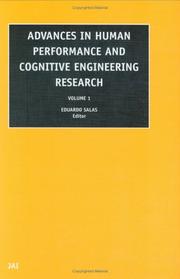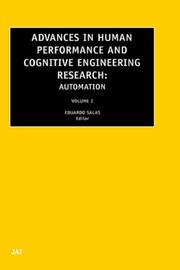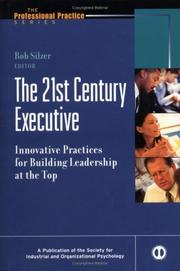| Listing 1 - 10 of 51 | << page >> |
Sort by
|

ISBN: 076230748X 1849500878 9786611025632 1281025631 0080543944 9781849500876 9780080543949 9780762307487 Year: 2009 Publisher: Bingley Emerald Group Publishing Limited
Abstract | Keywords | Export | Availability | Bookmark
 Loading...
Loading...Choose an application
- Reference Manager
- EndNote
- RefWorks (Direct export to RefWorks)
This volume launches a series that will focus on providing chapters that advance our understanding of human performance in organizational systems as cognitive engineering principles are applied. Topics addressed in this volume include: a historical review of a cognitive engineering research at a national laboratory; an adaptive learning system approach to designing an integrated-embedded training system; application of PRONET, a method that provides a useful representation of sequences of behaviour in a human-machine interaction; application of CTA, a method to explain the mental processes involved in performing a task; application of human performance modelling technologies in system design and evaluation; a review of training critical thinking skills that individuals and teams require in changing environments; a review of commercial simulations for team research; and research paradigms for human performance research in complex systems.
Human engineering. --- Human-machine systems. --- Human operators (Systems engineering) --- Human subsystems (Systems engineering) --- Man-machine control systems --- Man-machine systems --- Operator-machine systems --- Engineering systems --- Human engineering --- Ergonomics --- Human factors in engineering design --- Bioengineering --- Environmental engineering --- Industrial engineering --- Human comfort --- Human-robot interaction --- Technology & Engineering --- Psychology --- Cybernetics & systems theory. --- Cognition & cognitive psychology. --- Cognitive science. --- Industrial Design --- General. --- Industrial & Organizational Psychology. --- Science --- Philosophy of mind

ISBN: 9781849501453 1849501459 0762308648 9786611014797 1281014796 0080493238 9780080493237 Year: 2009 Publisher: Bingley Emerald Group Publishing Limited
Abstract | Keywords | Export | Availability | Bookmark
 Loading...
Loading...Choose an application
- Reference Manager
- EndNote
- RefWorks (Direct export to RefWorks)
We live in an ever complex, dynamic and technological-based world. A world where industries, businesses and agencies rely ever increasingly on automated systems to maintain efficiency, increase productivity, minimize human error or gain a competitive edge. Moreover, automation is now seen by many organizations as the solution to human performance problems. These organizations continue to invest significant resources to implement automated systems wherever possible and there is no doubt that automation has helped such organizations manage their sophisticated, information-rich environments, where humans have limited capabilities. Therefore, automation has helped to improve industrial and commercial progress to the extent that organizations now depend upon it for their own benefit. However, new and unresolved problems have arisen as more individuals, groups and teams interact with automated systems. Hence, the need and motivation of this volume. The chapters contained in this volume explore some of the key human performance issues facing organizations as they implement or manage automated systems. Dealing with a range of topics, from how to design optional use, avoiding misuse, to creating training strategies for automated systems, this volume also explores which theories may help us understand automation better and what research needs to be conducted. This publication attempts to illustrate how human performance research on automation can help organizations design better systems and also hopes to motivate more theoretically-based but practically-relevant research in the technological-based world of the 21st century.
Automation --- Human engineering. --- Human-machine systems. --- Human operators (Systems engineering) --- Human subsystems (Systems engineering) --- Man-machine control systems --- Man-machine systems --- Operator-machine systems --- Engineering systems --- Human engineering --- Ergonomics --- Human factors in engineering design --- Bioengineering --- Environmental engineering --- Industrial engineering --- Human comfort --- Human-robot interaction --- Human factors in automation --- Human factors. --- Medical --- Science --- Human-computer interaction. --- Automatic control engineering. --- Automation. --- Cognitive science. --- General. --- History. --- Philosophy of mind --- Automatic factories --- Automatic production --- Computer control --- Engineering cybernetics --- Factories --- Mechanization --- Assembly-line methods --- Automatic control --- Automatic machinery --- CAD/CAM systems --- Robotics
Book
ISBN: 2889638995 Year: 2020 Publisher: Frontiers Media SA
Abstract | Keywords | Export | Availability | Bookmark
 Loading...
Loading...Choose an application
- Reference Manager
- EndNote
- RefWorks (Direct export to RefWorks)
Book
ISBN: 2889662373 Year: 2020 Publisher: Frontiers Media SA
Abstract | Keywords | Export | Availability | Bookmark
 Loading...
Loading...Choose an application
- Reference Manager
- EndNote
- RefWorks (Direct export to RefWorks)
Book
ISBN: 1283604418 9786613916860 0199875545 9780199875542 9780195399097 0195399099 Year: 2013 Publisher: New York
Abstract | Keywords | Export | Availability | Bookmark
 Loading...
Loading...Choose an application
- Reference Manager
- EndNote
- RefWorks (Direct export to RefWorks)
Team training has become a tradition in healthcare, where it has helped produce significantly positive results in patient safety. It is widely acknowledged that medical teamwork is essential, yet the coordination, communication, and cooperation behind it has never been carefully examined. This book provides a comprehensive study of the science behind improving team performance in the delivery of clinical care. Leaders in the field, Eduardo Salas and Karen Frush, have assembled scholars, practitioners, and professionals to offer a combination of practical advice and insight as well as a look in
Patients --- Health services administration --- Safety measures.

ISBN: 0787952877 Year: 2002 Publisher: San Francisco (Calif.) Jossey-Bass
Abstract | Keywords | Export | Availability | Bookmark
 Loading...
Loading...Choose an application
- Reference Manager
- EndNote
- RefWorks (Direct export to RefWorks)
Book
ISBN: 9781849501910 1849501912 Year: 2009 Publisher: Bingley Emerald Group Publishing Limited
Abstract | Keywords | Export | Availability | Bookmark
 Loading...
Loading...Choose an application
- Reference Manager
- EndNote
- RefWorks (Direct export to RefWorks)
Digital
ISBN: 0123745187 9780080923024 008092302X 1282526146 9781282526143 9786612526145 6612526149 Year: 2010 Publisher: Amsterdam Elsevier
Abstract | Keywords | Export | Availability | Bookmark
 Loading...
Loading...Choose an application
- Reference Manager
- EndNote
- RefWorks (Direct export to RefWorks)
This edited textbook will be a fully updated and expanded version of the highly successful first edition of Human Factors in Aviation. Written for the widespread aviation community - students, engineers, scientists, pilots, managers, government personnel, etc.? HFA offers a comprehensive overview of the topic, taking readers from the general to the specific, first covering broad issues, then the more specific topics of pilot performance, human factors in aircraft design, and vehicles and systems. The new editors offer essential breath of experience on aviation human factors from multiple perspectives (i.e. scientific research, regulation, funding agencies, technology, and implementation) as well as knowledge about the science. The proposed contributors have all been chosen as experts in their fields. Topics carried over from the first edition will be fully updated, often by new authors who are now at the fore of the field. New material? which will represent 50% of the volume? will focus on the challenges facing aviation specialists today. One of the most significant developments in this decade has been NextGen, the Federal Aviation Administration's plan to modernize national airspace and to address the impact of air traffic growth by increasing airspace capacity and efficiency while simultaneously improving safety, environmental impacts and user access. NextGen issues will be covered in full. Other new topics include: High Reliability Organizational Perspective, Situation Awareness & Workload in Aviation, Human Error Analysis, Human-System Risk Management, LOSA, NOSS and Unmanned Aircraft System, (miliary aviation?).
Psychology --- Hygiene. Public health. Protection --- Air traffic --- psychologie --- veiligheid (transport) --- luchtvaart
Book
ISBN: 9780190056988 Year: 2020 Publisher: Oxford Oxford University Press, Incorporated
Abstract | Keywords | Export | Availability | Bookmark
 Loading...
Loading...Choose an application
- Reference Manager
- EndNote
- RefWorks (Direct export to RefWorks)
In Teams That Work, Scott Tannenbaum and Eduardo Salas present the seven drivers of team effectiveness and the clearest recommendations on what really makes teams great. Readers will find actionable, evidence-based tips for being an effective team leader, a great team member, a supportive senior leader, or an impactful consultant.
Article
Abstract | Keywords | Export | Availability | Bookmark
 Loading...
Loading...Choose an application
- Reference Manager
- EndNote
- RefWorks (Direct export to RefWorks)
| Listing 1 - 10 of 51 | << page >> |
Sort by
|

 Search
Search Feedback
Feedback About UniCat
About UniCat  Help
Help News
News